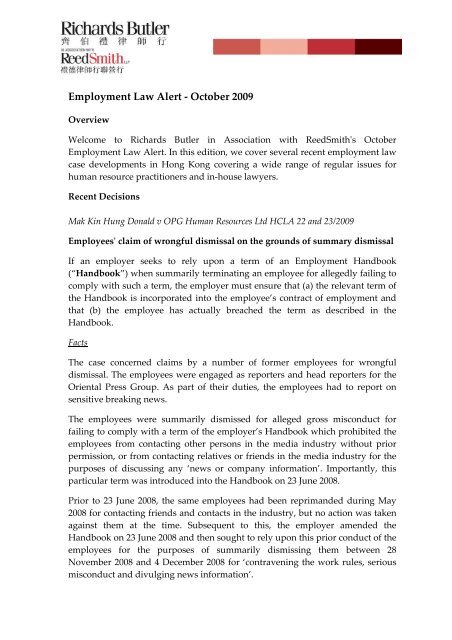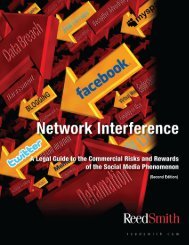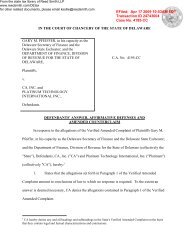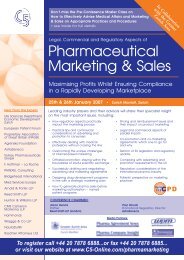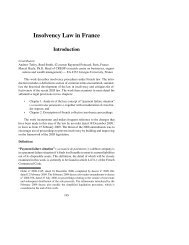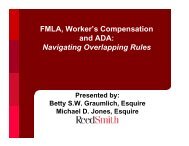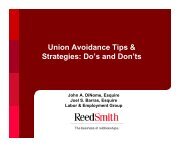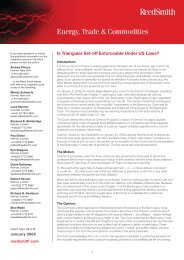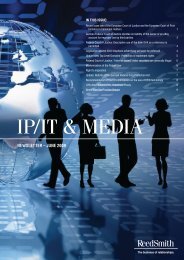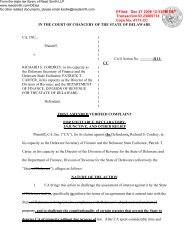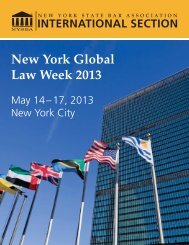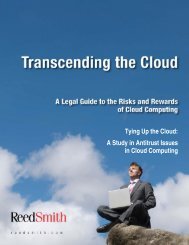Employment Law Alert - October 2009 - Reed Smith
Employment Law Alert - October 2009 - Reed Smith
Employment Law Alert - October 2009 - Reed Smith
You also want an ePaper? Increase the reach of your titles
YUMPU automatically turns print PDFs into web optimized ePapers that Google loves.
<strong>Employment</strong> <strong>Law</strong> <strong>Alert</strong> ‐ <strong>October</strong> <strong>2009</strong><br />
Overview<br />
Welcome to Richards Butler in Association with <strong>Reed</strong><strong>Smith</strong>ʹs <strong>October</strong><br />
<strong>Employment</strong> <strong>Law</strong> <strong>Alert</strong>. In this edition, we cover several recent employment law<br />
case developments in Hong Kong covering a wide range of regular issues for<br />
human resource practitioners and in‐house lawyers.<br />
Recent Decisions<br />
Mak Kin Hung Donald v OPG Human Resources Ltd HCLA 22 and 23/<strong>2009</strong><br />
Employeesʹ claim of wrongful dismissal on the grounds of summary dismissal<br />
If an employer seeks to rely upon a term of an <strong>Employment</strong> Handbook<br />
(“Handbook”) when summarily terminating an employee for allegedly failing to<br />
comply with such a term, the employer must ensure that (a) the relevant term of<br />
the Handbook is incorporated into the employee’s contract of employment and<br />
that (b) the employee has actually breached the term as described in the<br />
Handbook.<br />
Facts<br />
The case concerned claims by a number of former employees for wrongful<br />
dismissal. The employees were engaged as reporters and head reporters for the<br />
Oriental Press Group. As part of their duties, the employees had to report on<br />
sensitive breaking news.<br />
The employees were summarily dismissed for alleged gross misconduct for<br />
failing to comply with a term of the employer’s Handbook which prohibited the<br />
employees from contacting other persons in the media industry without prior<br />
permission, or from contacting relatives or friends in the media industry for the<br />
purposes of discussing any ‘news or company information’. Importantly, this<br />
particular term was introduced into the Handbook on 23 June 2008.<br />
Prior to 23 June 2008, the same employees had been reprimanded during May<br />
2008 for contacting friends and contacts in the industry, but no action was taken<br />
against them at the time. Subsequent to this, the employer amended the<br />
Handbook on 23 June 2008 and then sought to rely upon this prior conduct of the<br />
employees for the purposes of summarily dismissing them between 28<br />
November 2008 and 4 December 2008 for ‘contravening the work rules, serious<br />
misconduct and divulging news information’.
The <strong>Law</strong><br />
Section 9 of the <strong>Employment</strong> Ordinance (Cap 57) (“EO”) states:‐<br />
(1) An employer may terminate a contract of employment without notice or payment in<br />
lieu‐ (Amended 51 of 2000 s. 2) [emphasis added]<br />
(a) if an employee, in relation to his employment‐<br />
(i) wilfully disobeys a lawful and reasonable order;<br />
(ii) misconducts himself, such conduct being inconsistent with the due and<br />
faithful discharge of his duties;<br />
(iii) is guilty of fraud or dishonesty; or<br />
(iv) is habitually neglectful in his duties; or<br />
(b) on any other ground on which he would be entitled to terminate the contract without<br />
notice at common law.<br />
Whilst the employer in this case did not state exactly which specific head it had<br />
relied upon, it would appear that it relied upon Section 9(1)(a)(i) and Section<br />
9(1)(a)(iii) of the EO in relation to the employees’ failure to comply with the new<br />
term of the Handbook.<br />
It should be noted that summary dismissal under the EO is a very serious<br />
sanction for employers to take, which can result in serious financial loss for<br />
employees (such as for example in relation to the entitlement to a severance<br />
payment, annual leave and notice) as well as effect an employee’s prospects for<br />
gaining future employment. Where an employer fails to show an entitlement to<br />
summarily dismiss an employee, the employee may successfully make a claim<br />
for wrongful dismissal and Courts will examine an employer’s conduct carefully<br />
in light of the serious consequences faced by employees in these circumstances.<br />
Decision<br />
The Labour Tribunal at first instance found that the employer was not entitled to<br />
dismiss the employees summarily, as on the facts there was no conduct which<br />
justified such action. The employer appealed to the Court of First Instance<br />
alleging that the Presiding Officer of the Labour Tribunal had made several<br />
errors of <strong>Law</strong>. However, the Court refused to grant leave to appeal and agreed<br />
with the decision of the Labour Tribunal and held in particular that:‐<br />
• The relevant provision of the Handbook relied upon to summarily dismiss<br />
the employees’ employment was not incorporated into the employeesʹ<br />
contracts of employment at the relevant time and could not therefore be<br />
relied upon to ground the decision to dismiss summarily. As noted above, the<br />
provision of the Handbook was introduced on 23 June 2008. However, the
vast majority of the conduct complained of occurred prior to the introduction<br />
of the new clause in the Handbook and the employer did not at the time take<br />
action to terminate any employees’ employment in response to the offending<br />
conduct. Furthermore, the employer’s failure to act on the alleged misconduct<br />
at the time when it occurred meant that the employer had ‘waived’ its right to<br />
summarily dismiss in any event. Justice Chu stated:‐<br />
“Having decided not to terminate the employment then, the defendant [the employer]<br />
could not rely on these contacts to summarily dismiss these claimants some six or<br />
seven months later. The suggestion that the defendant did not in May 2008<br />
appreciate the gravity of the matter does not afford a justification for summary<br />
dismissal in December 2008.”<br />
• In addition, the employees’ conduct did not in any event factually breach the<br />
relevant term of the Handbook as amended.<br />
• In relation to a Mr. Lam (a single employee whose conduct did post‐date the<br />
amendment to the Handbook), the Court interestingly found that the term had<br />
still not been incorporated in the employee’s contract of employment.<br />
Importantly Justice Chu stated:‐<br />
“Before the amendments can be incorporated to become part of the employment<br />
contract, Mr Lam [the employee] must have notice and knowledge of the<br />
amendments. Even though he was under a contractual obligation to pay attention to<br />
the notice board and that he had failed to observe it such that he was unaware of the<br />
amendments, it does not mean that the amendments will, without more, become part<br />
of the employment contract.”<br />
Practical implications<br />
This case demonstrates the need to carefully review and amend Employee<br />
Handbooks, which may or may not form part of employees’ contracts of<br />
employment, as well as the need for employers to carefully investigate matters<br />
which may lead to the summary dismissal of an employee. In particular, an<br />
employer should carefully consider the exact wording of conduct it wishes to<br />
prohibit which may lead to summary dismissal and the employer should take<br />
special care to ensure that any ‘amendment’ to the Employee Handbook is<br />
actually incorporated into the <strong>Employment</strong> Handbook, so that it may be relied<br />
upon – if it indeed wishes to do so. In this case, the employer failed on all counts<br />
as the relevant term was not incorporated and nor was the wording specific<br />
enough to match the conduct alleged.
Furthermore, an employer should be careful to ensure that employees are aware<br />
of amendments to the Handbook in a manner that can be clearly evidenced and<br />
which is in line with the contractual provisions of the actual employment<br />
contract. Merely posting a notice or perhaps sending an email detailing an<br />
amendment may not be enough.<br />
Lastly, if an employer wishes to protect ‘confidential information’ (not that this<br />
case necessarily concerned ‘confidential information’) it should include carefully<br />
drafted confidentiality provisions in its employment contracts to protect such<br />
information post employment.<br />
HKSAR v Lam Lenor Chan MA No 125 of <strong>2009</strong><br />
Employer found guilty of failing to pay wages to an employee in breach of<br />
Section 23 of the EO and imprisoned for 3 months in accordance with Section<br />
63C of the EO<br />
This case involved an employer deliberately failing to pay a domestic helper her<br />
correct wages in contravention of Sections 23 and 63C of the EO and serves as a<br />
timely reminder for all employers (as these provisions relate to all employers in<br />
Hong Kong) to pay their employees both correctly and on time. Failure to do so<br />
can attract very serious criminal and civil liability, including both fines and<br />
imprisonment.<br />
Facts<br />
The employer engaged the domestic helper under an employment contract<br />
(“Contract”) which set out her salary in accordance with the legal minimum<br />
wage for domestic helps at the time ($3,270). However, after the domestic helper<br />
commenced working, the employer paid her $1800 to $2000 per month, for the<br />
majority of her 2 year Contract. The domestic helper didn’t question this until<br />
she left her employment as she claimed that she was not in the dominant<br />
position as the employer. The Court accepted her claim.<br />
In practice, the employer asked the employee to cash cheques for the full amount<br />
of her salary. The employer then asked the domestic helper to pay back a portion<br />
of her salary in cash, whilst at the same time asking her to sign a receipt<br />
evidencing payment for the full amount. These facts were established through<br />
the credibility of the domestic helperʹs evidence and a recording made by the
domestic helper of a discussion between herself and the employer which was<br />
admissible despite it being recorded without the knowledge of the employer.<br />
The <strong>Law</strong><br />
Section 23 of the EO states:‐<br />
“Wages shall become due on the expiry of the last day of the wage period and shall be paid<br />
as soon as is practicable but in any case not later than 7 days thereafter.”<br />
Section 63C of the EO states:‐<br />
Any employer who wilfully and without reasonable excuse contravenes section 23, 24 or<br />
25 commits an offence and is liable to a fine of $350000 and to imprisonment for 3 years.<br />
These provisions combine to create serious obligations and consequences for<br />
employers to pay wages on time. As Section 63C of the EO was only recently<br />
amended, it appears that the Courts are now more willing to hand down harsher<br />
sentences for this offence.<br />
The Decision<br />
This matter involved an appeal from a Magistrates’ decision to impose a 9 month<br />
prison sentence upon the employer. Whilst the appeal was partially successful in<br />
reducing the sentence, Justice Line otherwise agreed with the sentiments of the<br />
Magistrate.<br />
Importantly in imposing a 3 month jail sentence, Justice Line noted that, whilst in<br />
his view 9 months was a heavy sentence, the Legislative Council had recently<br />
increased the penalties for failure to comply with Section 23 of the EO to a 3 year<br />
imprisonment term and a fine of $350,000 and as such:‐<br />
“Sentences which have attracted fines or community service have, in my view, to this<br />
point been inadequate. The deliberate raising of the maximum sentence of imprisonment<br />
to 3 years by the legislature in 2006 must have been undertaken for good reason, and the<br />
legislative intent is only too clear.”<br />
Therefore in this case where the employer had “deliberately and consistently”<br />
underpaid the employee and then sought to “have her cake and eat it too” by<br />
taking the matter to trial, the Judge commented that ʺyou cannot expect to be<br />
shown the mercy of community service and save yourself from imprisonment”.
Practical implications<br />
Whilst this case involved the deliberate and consistent failure to pay an<br />
employee her proper wages, it does serve as a timely reminder that the failure to<br />
pay an employee properly and on time can lead to some very serious<br />
implications indeed. It should be noted that whilst this case involved the<br />
employment of a domestic helper, the stated provisions apply equally to<br />
employees in general. This case further demonstrates an increased willingness of<br />
the Courts to impose harsher penalties in circumstances where past decisions are<br />
now considered inadequate.<br />
Employers should ensure that they pay all entitlements and wages on time and<br />
more so, that such wages and entitlements are calculated correctly to ensure that<br />
the employee is properly remunerated. These entitlements also do of course<br />
include termination payments which may or may not include a calculation of an<br />
employee’s commission (as it may fall within the definition of wages under the<br />
EO due to recent legislative amendments).<br />
We suggest that employers, human resource manages and pay roll managers<br />
develop a comprehensive understanding of staff remuneration and calculation of<br />
entitlements under contracts of employment and the EO (which can override<br />
employment contracts to the extent that the employment contract attempts to<br />
override the EO). As a practical consideration, it is quite possible that the Labour<br />
Department and the Courts will take a stricter approach with a medium‐sized or<br />
large employer which they may assume has the resources to ensure compliance.<br />
Lastly, employers should be wary of discussions that they have with employees,<br />
particularly over disputed remuneration as they may find themselves being<br />
recorded, especially seeing as Courts will accept such recordings into evidence.<br />
In this regard, we suggest that any discussions with employees over such matters<br />
be done face to face and involve witnesses. Accurate written records of any such<br />
discussions should also be kept.<br />
Wong Yu Tui DCEC No. 886 of 2008<br />
Whether an employee was an independent contractor for the purposes of the<br />
Employees’ Compensation Ordinance and insurance coverage<br />
Determining whether an individual is an employee or an independent contractor<br />
can raise critical questions in terms of a party’s liability – such as in relation to
Employees’ Compensation, compliance with safety legislation and of course the<br />
EO, as well as possible mandatory pension benefits. This case once again<br />
demonstrates some of the factors Courts consider in determining this important<br />
question and the need, practically speaking, to set out such arrangements clearly<br />
and concisely in independent contractor / labour hire agreements. In this way, a<br />
company and / or individual can reduce liability and shift risk.<br />
The Facts<br />
The Applicant was a construction worker specialising in demolition. The<br />
Applicant argued that he was an employee within the common law meaning of<br />
the phrase and therefore entitled to Employees’ Compensation under the<br />
Employees’ Compensation Ordinance (Cap. 282) (“ECO”) for injuries he had<br />
sustained whilst working for the two Respondents. The 1 st Respondent failed to<br />
appear. The 2 nd Respondent argued that the Applicant was not an employee of<br />
his, but rather an independent contractor engaged to perform demolition work<br />
on this basis.<br />
The issue for the Court to consider was whether the ‘person providing the<br />
services can be said to be conducting business on his own account, or merely<br />
working for the pay’.<br />
The Applicant was engaged by the 2 nd Respondent to perform demolition work<br />
on a house. The 2 nd Respondent was in turn engaged by the principle contractor<br />
(named as the 1 st Respondent) to perform the same job. The Applicant claimed he<br />
was employed by the Respondents.<br />
The 2 nd Respondent and the Applicant met on 16 <strong>October</strong> <strong>2009</strong> and travelled to<br />
the house where the work was to be performed and the Applicant represented<br />
that he would bring 2 additional workers with him to complete the demolition<br />
job. All parties agreed upon the terms of payment the following day. However,<br />
on the second day of work the Applicant was injured at work. The 2 nd<br />
Respondent informed the Applicant however that he did not have employees’<br />
compensation insurance and denied that that the Applicant was employed by<br />
him. It should be noted that the 2 workers brought in by the Applicant filed a<br />
separate claim with the Labour Department against the 1 st Respondent for wages<br />
in arrears and that their claim were settled by the 2 nd Respondent after<br />
mediation.
The <strong>Law</strong><br />
Justice Leung stated in determining the nature of the relationship “the Court’s<br />
role is to examine all the features of the relationship between the parties<br />
concerned with a view to deciding whether, as a matter of overall impression, the<br />
relationship is one of contract for service or contract of service”.<br />
Relevant factors that the Court may have regard to include (but are not limited<br />
to):‐<br />
• The degree of control exercised by the party engaging the individual;<br />
• Whether the person performing the services provided his / her own<br />
equipment;<br />
• Whether the person performing the services hired his / her own helpers;<br />
• What degree of financial risk the person performing the duties exposed<br />
himself / herself to; and<br />
• The degree of responsibility for investment and management and whether he<br />
/ she had a chance of profiting from sound management of the services.<br />
In “a nutshell, the Court is to find whether the person providing the services can<br />
be said to be conducting business on his own account or merely working for the<br />
pay”. This test follows the test set out in the Court of Final Appeal decision of<br />
Poon Chau Nam v Yim Siu Cheung (2007) 10 HKCFAR 156.<br />
The Decision<br />
The 2 nd Respondent argued that the Applicant was an independent contractor on<br />
the basis that he was not supplying the Applicant with any equipment, he was<br />
not supervising the Applicant’s work and was not being present during the<br />
performance of the work – therefore lacking control of the Applicant. The 2 nd<br />
Respondent gave evidence to the effect that if he had employed the Applicant he<br />
would have been present and would have directed the Applicant when to take<br />
work breaks and when he could cease work. At the very least, there would be a<br />
requirement for the Applicant to inform him that he had ceased work, which he<br />
did not.
However, the Court found that the Applicant was an employee of the<br />
Respondents. The Court held that the lack of control and supervision of the<br />
Applicant was a ‘neutral’ factor in the case of experienced individuals such as the<br />
Applicant. Furthermore, the Court essentially dismissed the 2 nd Respondent’s<br />
evidence as to how he would have dealt with the Applicant had he hired him as<br />
an ‘employee’ as he again was of the view that this would not be necessary with<br />
and experienced employee.<br />
Although there was a dispute over who had supplied the equipment, the Court<br />
preferred the evidence of the Applicant in finding that he was an employee<br />
based upon all of the above factors. Consequently, the Applicant was entitled to<br />
compensation under the ECO.<br />
Practical implications<br />
Businesses should be particularly careful when engaging persons as<br />
‘independent contractors’ as Courts will not be reluctant to go behind the title of<br />
the arrangement to examine the true nature of the relationship overall. Therefore,<br />
businesses should carefully set out their independent contractor arrangements in<br />
a well drafted agreement reflecting this arrangement. Furthermore, this<br />
arrangement should reflect the reality of the situation.<br />
Businesses should also recognise that other legislation such as the Race<br />
Discrimination Ordinance (cap. 602) covers contractors as well as employees, so<br />
such arrangements can not always shift risk in any event.<br />
Lastly it is always preferable (if possible) for businesses to engage independent<br />
contractors who are incorporated, as this places a further layer between the<br />
business and the individual (assuming that the individual is a sole<br />
shareholder/director of a company).<br />
If you require any further information on any of the above articles please let us<br />
know.
<strong>Employment</strong> <strong>Alert</strong> Case Update Seminar<br />
Due to popular demand and feedback received Kevin Bowers, Partner and<br />
Lincoln Kinley (a dedicated employment lawyer) will be holding three free<br />
identical lunchtime seminars focusing exclusively on employment and antidiscrimination<br />
law cases on 19, 24 and 26 November <strong>2009</strong> between 1:00 p.m and<br />
2:00 p.m. at our offices at Level 20, Alexandra House, 16‐20 Chater Road Central<br />
Hong Kong. To register for one of these seminars please contact Lincoln Kinley<br />
either via email at lkinley@rsrbhk.com or telephone on 25079833.<br />
As stated above the format of our presentation will focus on actual decided cases<br />
and will cover various aspects of employment law including those above as well<br />
as more recent decisions. The format will be interactive and include contributions<br />
by participants. Please register early to avoid disappointment.<br />
<strong>October</strong> <strong>2009</strong><br />
RICHARDS BUTLER<br />
in associated with <strong>Reed</strong> <strong>Smith</strong> LLP<br />
Disclaimer: The information contained in this article is intended to be a general guide<br />
only and is not intended to provide legal advice.


